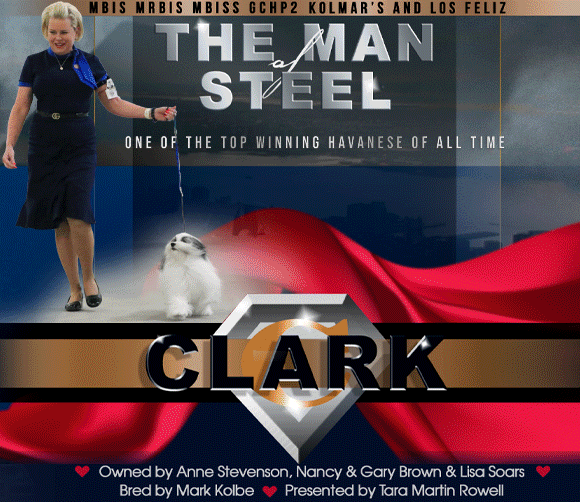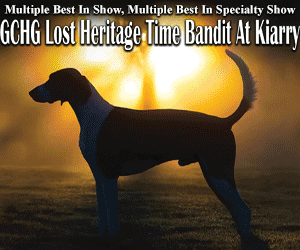From The CC Vault: The Judge/Breeder/Exhibitor Conundrum
by Gay Dunlap
From the archives of The Canine Chronicle, September, 2005
 Those of us who have joined the ranks of AKC Judge, following involvement in the fancy as Breeder/Exhibitor, often come under fire if we have chosen to continue in this latter role. Whereas our passion for breeding may not, of itself, be subjected to criticism, exhibiting can, and often does, cause a few hackles to rise. It may ultimately lead to condemnation, if not directly, certainly behind our backs. There is little doubt that taking part in this sport, on all levels, requires broad shoulders.
Those of us who have joined the ranks of AKC Judge, following involvement in the fancy as Breeder/Exhibitor, often come under fire if we have chosen to continue in this latter role. Whereas our passion for breeding may not, of itself, be subjected to criticism, exhibiting can, and often does, cause a few hackles to rise. It may ultimately lead to condemnation, if not directly, certainly behind our backs. There is little doubt that taking part in this sport, on all levels, requires broad shoulders.
Several months ago word got back to me that a couple of my fellow exhibitors were complaining that someone of my “stature and prominence” should not be showing. The conversation led to a broad discussion of other judges… those who do, vis-à-vis those who do not exhibit their own dogs and the effect this has on the fancy. The person who chose to bring this topic to the table was amazed as I began to rattle off judges, many of far more prominence and stature in their respective breeds than I, who regularly exhibit. I reminded him that I had shown two bitches, one in each of the last two years, finishing both from the Bred-By Exhibitor class. Whereas both were lovely examples of my breed, one lacked the stature and the other lacked the charisma necessary for a successful career as a special. I went on to say that had either shown promise as such, it was nonetheless irrelevant since my financial resources precluded such extravagance. I added that were I to be so privileged as to win the lottery down the road and subsequently produce something deserving of a special’s career, I would consider hiring a handler. However, since this scenario would require a stroke of incredible good fortune, it was quite unlikely.
Many agree that judging at group level while personally campaigning a special, be it very competitive or even mildly so, constitutes a serious conflict of interest. There are ways of circumventing this situation, however, as we all know; there is the aforementioned hiring of a handler. Another widely used method for the exhibitor-cum-judge is to sell or lease the dog. But, what if this exhibitor/judge wants to do the honors himself? Could a judge put his license on hold for a year or for however long the dog is to be campaigned? Sabbatical leaves are quite acceptable in most fields of endeavor. Might this be a viable solution?
On more than one occasion, I have declared that if I had to give up breeding in order to judge, I would give up judging. Judges who still breed with passion and dedication tend to share this sentiment. I think none would deny that the breeder is unequivocally the backbone of our sport. And, taken further, the fact is that many of our master breeders are now judges. This is not to say that all judges are master breeders or that all master breeders are judging. Some of our finest breeders have chosen to terminate their breeding activities and have subsequently become our finest judges. Conversely, there are breeders who take that first step toward judging by applying to judge their own breed, only to find they are feeling conflicted over the decision, uncomfortable with the dual role of breeder and judge. Unwilling to give up breeding, they resign their judging status.
What about the breeder-judge (and there are many still actively breeding)? Let’s consider a possible scenario. Our hypothetical breeder-judge is invited to judge her national specialty. She also has a bitch she will be breeding several months prior to her assignment. What, if any, protocol exists that might cover the situation vis-à-vis her choice of stud dog and possibly being faced with judging him down the road? This question was posed on the internet recently. The responses were broad and ranged from “Just judge the dogs” to “Either don’t use a dog that will be shown to you or don’t judge the specialty”, to “No one you have done business with can show any dog they own to you for a period of one year.” The latter response assumes that breeding your bitch to a stud dog constitutes a business transaction.
We are dealing with an intensely gray area here and the answers to our judge’s question reflected this fact. Some felt the judge should ask that the dog not be shown to him/her. Then what? Might the stud dog owner respond by refusing to allow the bitch to be bred to their dog? Which might be more important, winning a specialty or pocketing a stud fee?
Another judge stated it a different way, saying we have “pretty good flame-retardant suits”.”
Judges do ask those exhibiting a dog either bred or co-bred by them not to show the dog under them. This request is, in most cases, honored. Only once in all these years was a dog shown to me that I bred. She was co-bred, lived in another part of the country and shown by a handler. I had no idea who she was, really liked her, and gave her Winner’s Bitch. I may even have taken her further, but it was quite some years back and my memory fails me. What I do remember, however, is being quite out of sorts when I noted in the catalog that I put up a bitch I had co-bred. So, it can happen.
There are some judges who will request that the owners of a stud dog used by them not show under them following the breeding, usually for a specified length of time. One judge admitted, however, to this “causing a problem” since she often judged in the stud dog owner’s territory while the dog was being seriously campaigned.
There are those who do not want offspring of their stud dogs shown to them. Unless you, the judge, as the owner of the stud, have an ongoing relationship with the owner of the dam and/or the owner of a pup or pups, it would be almost impossible to determine this by looking, wouldn’t it? If you do have similar close ties or the offspring are easily recognizable, you are treading on soft ground and may leave yourself open for censure.
“Judge the dogs on the day,” we are advised, and indeed we strive to do this. Most of us are quite clear when good friends approach about showing to us. My own response has always been, “If you can’t take losing under me then don’t show to me.” I have already alluded to the necessity of having broad shoulders. Another judge stated it a different way, saying we have “pretty good flame-retardant suits”.
All of this boils down to determining whether or not a specific scenario represents a conflict of interest…whether or not it encumbers a judge’s reputation or is ethically dubious. The AKC states openly that they understand it is only natural for judges to want to continue breeding and exhibiting. They also make it clear that judges who exhibit are a major source of complaints. They recognize that judges cannot control who enters under them and consequently situations may arise that may require the excusing of an exhibitor due to a conflict of interest known to them.
Further, the AKC requires that judges both possess and project an “unwavering air of integrity and ethical behavior”. They go on to remind us that, whereas guidelines can never cover every situation, with common sense, judges can avoid situations that might raise ethical questions. AKC presumes judges to be “honest, competent and dedicated” and states in its Guidelines for Conformation Dog Show Judges, “Obviously some ethical rules are clear”. One of these rules states, “Advise potential exhibitors not to enter under you when their presence or the presence of their dogs might give the impression of unfair advantage”; e.g., if the exhibitor is your employer or an employee; a relative; a person with whom you co-own dogs; a person with whom you travel to dog shows. We are reminded that the key is to avoid situations that are likely to give the impression of impropriety.
The bottom line here is to let your conscience be your guide. If a given situation creates tension within or has the potential to cause discomfort, don’t do it. AKC states there will always be those “gray areas” that perplex judges and confirms using your conscience as a guide, calling it a “Handy Rule of Thumb”. “If you have concerns about whether something is inappropriate, you probably should avoid the situation.” At the same time, we must be cognizant of the fact that what may cause discomfort for one judge may not for another. It is not a matter of right or wrong in most instances, particularly with those not governed by guidelines. It is simply a matter of what feels right ethically and morally. And in the end, no matter the circumstance, as judges we still need the fortitude to withstand the slings and arrows!
Short URL: https://caninechronicle.com/?p=281680
Comments are closed












